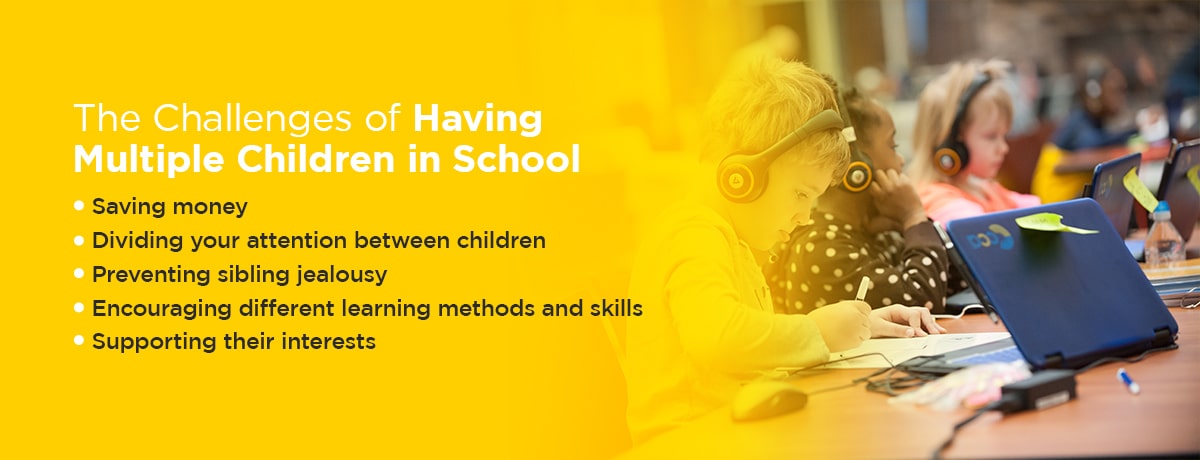Enrollment Now Open for Second Semester. Click Here
Enrollment Now Open for Second Semester. Click Here

As a parent, you always want to make the best decisions for your children, especially when it comes to their education. However, when you have multiple kids in school at the same time, it can be more challenging to ensure each child receives your undivided attention and support.
The right cyber school will provide the flexibility, one-on-one instruction, and personalized curriculum your children need to grow into their potential along their educational journey.

Even having one child in school can be difficult to manage — helping them stay on track with schoolwork and ensuring their education meets their needs takes a lot of time and effort. Having multiple children in school at once presents additional potential challenges, which may include:
Families with multiple children in school at the same time can run into obstacles while trying to balance work, school, and home life. With such busy schedules, it can be tricky to keep everyone on track. Here are some tips for parents to keep in mind along this journey:
Every parent wants their child to explore new possibilities and experiences. In school-age years, this usually involves signing your child up for after-school activities, such as sports or music lessons. Many children will jump at the opportunity to engage in such activities with their friends or explore something new and exciting. However, it’s important not to force your child into any activity they may not want to do.
For example, pushing your child to play a certain sport because it’s popular at their school, even if they’re not interested, can result in them developing a “follower” mentality instead of nurturing their individuality. While team sports offer healthy physical activity, life lessons, and personal growth, your child won’t truly reap these benefits if they dislike going to soccer practice every day.
Making your child play an instrument can have the same effect. Though musical education is important for children to show them patience, hard work, and perseverance, it can feel like a chore if it’s not something they enjoy.
Children don’t yet have the life experience to determine what’s best for them, but that doesn’t mean they shouldn’t get a choice. If you want to encourage learning skills through music or sports, give your child options.
Your children have entirely different personalities, dreams, and interests. Some parents may expect their kids to be the same in the way they react to a certain situation or how they express their emotions. However, all children have unique ways of processing their emotions or engaging with others.
Pointing out one child’s fault by comparing them to their sibling can lead to sibling rivalry, rebelling, and lower self-esteem. When parents make kids feel pressured to be exactly like their siblings, the message they hear is that they’re not good enough. Children learn to internalize these pressures, so avoid comparing your children. Saying things like “Why can’t you be like your brother/sister?” can make a child feel you prefer their sibling over them.
In some cases, healthy comparisons can help motivate your children to learn from each other and become better versions of themselves, such as having their older sibling show them how to complete a chore or help them improve their basketball skills.
Most of the time, it’s best to focus on how each child has a unique identity and not expect them to be like their sibling. In a world where everyone already compares themselves to others, it’s essential to build up your children’s confidence and encourage them to love who they are.
Every child has unique social, emotional, intellectual, and physical qualities. For this individuality to be respected, it’s vital to be your child’s first supporter. You can encourage confidence and higher self-esteem in your children by helping them point out the things they like about themselves and highlighting their differences in a healthy, positive way.
Rather than pushing them toward conformity, celebrate what makes them stand out. You can do this by:
No matter how you go about it, encouraging your children to embrace their individuality can have a positive effect on them. Practicing positive talk about your own unique qualities and personality traits can help them learn to build a strong sense of self.
As they get older, they’ll appreciate those differences in others instead of being judgmental when they meet someone who doesn’t conform to society’s standards. This strong foundation can also make them less likely to give in to peer pressure in the future and maintain healthy self-esteem as they grow into adulthood.
Children have entirely different learning methods, regardless of whether they’re related. For example, you may have two older children who always perform well in science, while your youngest seems to fall a bit behind.
This doesn’t mean your younger child isn’t working hard enough or trying their best. It may simply mean they take a bit longer to absorb the subject. Children’s ability to do well in a certain course can also depend on the teaching methods their teachers use, distractions in class, and general disinterest in the course.
Try to keep this in mind if you notice one child does better in certain subjects than another. Here are four main types of learning methods to better understand how your children might learn:
If you notice your child struggles in a certain subject, it’s always best to consult with their teacher and inquire about introducing new learning techniques to help them engage. You might even try practicing some of these techniques with them to see if you notice them improving or becoming more interested in the subject. While these learning styles may not accelerate your child’s learning, they can certainly promote their participation.
Regardless of your child’s educational and extracurricular interests, the most important thing you can do is support them. Offering support to your children can help them regulate their emotions and become productive and compassionate members of society. These are some ways you can support your children:
Just like adults, children have different ways they need and want support. While one child may appreciate your verbal encouragement and praise, another may seek support by doing one-on-one activities with you. The best way to navigate this with multiple children is to ask each of them how you can support them.
For instance, asking them questions like, “What can I do to make you feel better?”, “Do you need help with that?”, or “Do you need time alone or would you like to talk about it?” can help show your support. Younger children may not know exactly what type of support they need yet, but you can give them options that suit their needs.
No matter how your children need your support, remind them that expressing their emotions and needing help or guidance is healthy.
When your child feels jealous of their sibling, it can affect their relationship and create a pattern. For instance, seeing other children get more attention from their parents or the arrival of a new baby can cause kids to throw tantrums or become angry with their siblings. While jealousy is a feeling we all feel from time to time, children have to learn how to deal with it before it gets out of hand. Jealousy can lead to bullying, isolation, low self-esteem, or aggression toward other kids.
The first step to dealing with jealousy is identifying the root cause of these feelings. Is your child feeling jealous over material items their friend has? Are they upset that their sibling has made more friends than them at school? Do they envy the academic success of others in their class? Consider the reasoning behind their jealousy so you can help them work through it.
No matter what type of jealousy they’re experiencing, it’s important to acknowledge it and find ways to help them work through it in a healthy and positive way. Here are some ways to help your children deal with jealousy:
Many parents fondly imagine the day their child will grow into a young adult and be off to college. Saving money for college early on can prevent stress in the long run and ensure each of your kids has the same opportunity. To get started, research different savings accounts and college funds for educational expenses in your state.
You may also consider having friends and family donate money toward your children’s college funds for their birthdays and holidays instead of buying gifts. After all, you likely have plenty of toys around your house, especially if you have several children. Having loved ones contribute to their futures is an effective way to give them a head start.
When the time comes for your children to apply for college, you can apply for financial aid if your family qualifies via the Free Application for Federal Student Aid. Further, you and your children can research different scholarships to help support them financially during school. There are thousands of scholarships available through various programs, so your kids should be able to apply for many that suit their needs and strengths.
When it comes to your children’s education, you want to give them the best of the best.
With a personalized online curriculum and a flexible online learning environment at Commonwealth Charter Academy (CCA), all of your children can benefit from dedicated teachers, school counselors, and administrators who want to see your children grow and succeed as much as you do. At CCA, we’re committed to helping every child gain essential skills and become active participants in their education while valuing their individuality and honoring what makes them all unique.
We value all students’ personal needs, interests, and skills and support them throughout their entire academic journey with hundreds of educational and social activities. Connect with us today to learn why CCA’s cyber school program is the ideal fit for your children.
Enrollment Now Open for Second Semester. Click Here